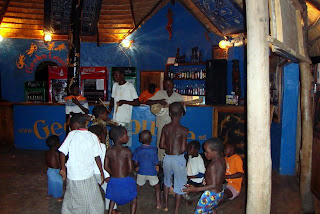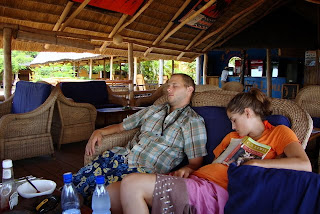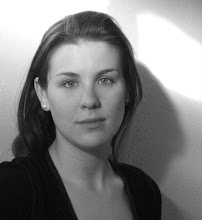So I'm going to post about the lake but first I wanted to post about my draining but satisfying day:
You know your week (and month for that matter) is going to be interesting when it starts with a toilet that doesn't flush, spilled placebo (juice) and a skinned knee. Luckily, after these minor issues (the last being the biggest blow...to my pride), Gus came to my rescue. After falling, I got up, tried to play it off like it was no big thing, fell again and finally staggered to the car. When I opened the door, however, Gus was playing Leona Lewis at full blast even though I already told him that BBC Africa was OK by me. Ah, the restorative power of bad pop music.
Mondays we always visit sites in the Shire (pronounced she-ray Valley which is, in the words of our team: dirty hot. And Mitondo, the site we went to this week, is also a dirty long drive. As Gus had kindly indulged my prediliction for horrible music, however, I could have sat in the car for another couple hours. When you roll up to a site listening to Akon's "So Paid," you know that your week/month is irrelevant because you are so freaking happy at the moment.
But I digress. Our clinic went fairly smoothly although Mitondo is kind of annoying because the moms were showing up late and sort of trickling in which makes it very difficult to get things done in an efficient manner. We'd measure 10 kids, go help weigh some, measure a few more, make some antibiotics, weigh some more kids, wander around, measure some more etc etc ad nauseum.
When we finally finished at clinic we determined that our day was not quite over. We would have to make a home visit. When a mother fails to show up to clinic, we create a "send the message" card and give it to the HSA that is responsible for that family's village. The HSA delivers the card to their house and lets them know when the next appointment is. In order to find these missing children, we always ask directions to the home on the original study form. Now when I say "directions," I don't mean the kind that MapQuest gives. A typical "directions" section reads like this: "from Namphungo Health Center, go down road until Nhware village. Once there, go to second bore hole and ask about family at Mr. Nrwutu's home behind maize mill." Amazingly, the HSAs seem to find these families with no issue. They generally are able to get the mother to come to the next village or bring back news that the child has passed away.
Today, however, this mother had failed to respond to two separate send the message cards and the village HSA was working with us at clinic and informed us that the child was still alive. On our way home, therefore, we stopped on the road and, with the HSA, ventured into the village to find the mother. When we got to the hut we found the child and the father. The mother was inside and, they informed us, had just given birth the night before. This sent the HSAs into a tizzy becuase giving birth at home is illegal- mothers must go to the local Health Center or they must give a goat to the village chief as a punishment. This is policy is apparently meant to discourage home birth because of the increased risk of complications (although having seen the Health Centers which are little more than Tylenol dispensaries with a row of dingy old beds I think that the increased benefit is minimal).
I told the HSAs that they could deal with the unauthorized birth later and asked the mother to bring her older child to the road so that we could measure her. We determined that this child (the older one who was in the study) was fine and asked the mother why she had missed clinic. She told us that she had run away from the child's father and was gone for several months. They apparently reconciled because she was back in the village living with him. In the course of the conversation, however, the HSA informed us that the mother said that her new baby was 2 months premature, hadn't cried and wouldn't nurse. As this was clearly a serious situation, we told the mother to go get the baby and we would bring the baby to the nearest Health Center where they could get an ambulance to the district hospital. As the mother turned around to go back and get the infant, however, she basically collapsed. We picked her up, put her in our car, went and got the baby ourselves and headed to the Health Center. During the ride to the health center I had this tiny baby in my lap. It was so cold and so puny. It's hard to describe how I felt: it almost didn't seem real but at the same time I felt protective and scared.
When we got to the health center, however, there was no clinical officer and no ambulance. So we piled back into the car and drove an hour to the hospital. During the ride, I was trying my damndest to keep that little tiny thing warm. It was barely moving and it was taking labored breaths. As soon as we stepped out of the car at the hospital, however, the baby had begun to sort of mew in a high pitched voice. We left the baby and mother at the maternity ward and finally headed home.
While I feel good about the fact that we took the baby to the hospital (it almost certainly would have died at home because it was too small and lethargic to nurse), it doesn't feel like a clear victory. The hospital, while better than the health center, is abysmal. The mothers lie on garbage bags instead of sheets, the water is most likely infected with cholera and the resources are severely limited. Add to that the fact that this woman's husband is probably a dead beat and you begin to realize that you may have helped the baby but you did not save the him or his family by any means. I comfort myself, however, with the knowledge that we truly did the best we could.
As we were leaving the hospital, Rose, one of our nurses, turned to me and said: "that baby was so very warm as if he had been with his mother. You did an amazing job of taking care of the baby." And that is what I am going to take away from this hectic Monday.
















































